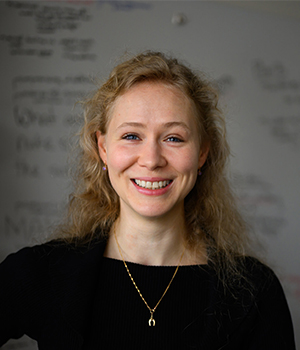
Mariya Grinberg
(she/her)
Political Science
Commitment to Intellectual Growth
When Mariya Grinberg joined the MIT Security Studies Program as a faculty member in 2021, the department was in a state of flux. The pandemic was in full swing, several core faculty members were nearing retirement, and the program had welcomed the largest cohort of PhD students in its history. As Grinberg entered the community, she embraced these challenges, meeting and exceeding her expected duties as an advisor.
Grinberg is an Assistant Professor of Political Science at MIT. Her group’s research interests center on the question of how time and uncertainty shape the strategic decisions of states, focusing on order formation, military planning, and questions of state sovereignty.
Commitment to intellectual growth
In her role as Assistant Professor of Political Science at MIT, Grinberg’s research interests center on the question of how time and uncertainty shape the strategic decisions of states, focusing on order formation, military planning, and questions of state sovereignty.
As a junior faculty member, Grinberg shoulders one of the largest advising loads in the department. Despite this, multiple nominators praised Grinberg for her prompt and discerning feedback. Students note her efforts in reading through and commenting on many rounds of paper drafts, supplemented by hour-long brainstorming sessions at her whiteboard. “It’s rare that someone can become both your most incisive critic and staunchest advocate,” a nominator noted. “I never took it for granted.”
Throughout these sessions, Grinberg delivers her advice with both confidence and empathy. One nominator shared how meetings put them at ease: “Normally, I am quite anxious about meeting with faculty, but I never felt that way during my meetings with Mariya.”
Embracing failure
Grinberg believes that failure is an integral part of the learning process and encourages her students to embrace and learn from setbacks. She acknowledges that the pressure to accomplish tasks within time constraints often leaves little room for failure, which can lead to decision paralysis. Grinberg reassures her students that investing time in a dissertation idea, even if it turns out to be unviable, is not time wasted.
When asked about her philosophy on mentorship, Grinberg emphasizes that the advice of mentors is just that – advice. It represents their best effort to steer students in what they perceive to be a fruitful direction, but it does not mean the advice is invariably correct. Grinberg encourages students to critically evaluate any feedback and make their own judgements that may not align with their advisor’s thoughts.
Grinberg shares a concept she first learned from a creative writing professor: “When someone tells you there is something wrong with your work, 90% of the time they are right. When someone tells you how to fix it, 90% of the time they are wrong.”
